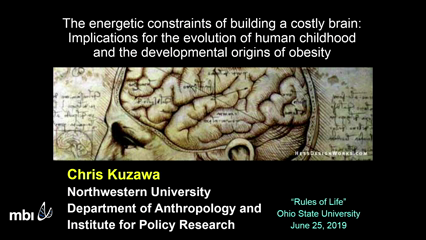MBI Videos
Christopher Kuzawa
-
 Christopher KuzawaMany adults who are overweight were already overweight as children. What accounts for who gains excess weight early in life and who, as a result, is at increased risk for becoming an overweight or obese adult? In my talk I will present our recent work that shows that the brain accounts for a lifetime peak of 66% of the body’s resting metabolic expenditure at 4-5 years of age, and that there is a strong inverse relationship between developmental changes in brain energetics and the rate of body weight gain between infancy and puberty. The peak in brain developmental energetics traces to synaptic and other energetically costly processes related to neuronal plasticity and learning, and requires compensatory reductions in other expenditures like body growth. In the second half of my talk, I will review evidence linking brain energetics with overweight and obesity during childhood, and argue that variation in the timing and intensity of the brain energetics peak could help explain the well-documented finding of an inverse relationship between the BMI and cognitive function. This framework could also help explain emerging evidence for genetically-mediated trade-offs (pleiotropy) between cognitive development and body fat gain. In closing, I argue that educational interventions that harness plasticity in these traits, and increase the peak or duration of brain developmental energetics, could lower obesity risk by increasing the brain’s energy needs and the strength of energetic trade-offs with fat deposition.
Christopher KuzawaMany adults who are overweight were already overweight as children. What accounts for who gains excess weight early in life and who, as a result, is at increased risk for becoming an overweight or obese adult? In my talk I will present our recent work that shows that the brain accounts for a lifetime peak of 66% of the body’s resting metabolic expenditure at 4-5 years of age, and that there is a strong inverse relationship between developmental changes in brain energetics and the rate of body weight gain between infancy and puberty. The peak in brain developmental energetics traces to synaptic and other energetically costly processes related to neuronal plasticity and learning, and requires compensatory reductions in other expenditures like body growth. In the second half of my talk, I will review evidence linking brain energetics with overweight and obesity during childhood, and argue that variation in the timing and intensity of the brain energetics peak could help explain the well-documented finding of an inverse relationship between the BMI and cognitive function. This framework could also help explain emerging evidence for genetically-mediated trade-offs (pleiotropy) between cognitive development and body fat gain. In closing, I argue that educational interventions that harness plasticity in these traits, and increase the peak or duration of brain developmental energetics, could lower obesity risk by increasing the brain’s energy needs and the strength of energetic trade-offs with fat deposition.
